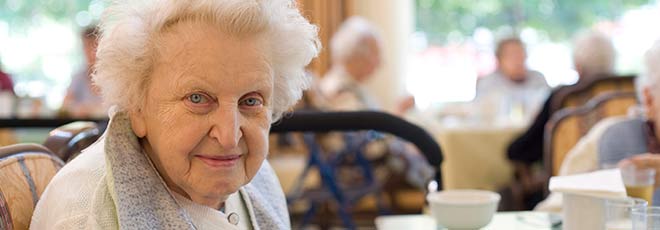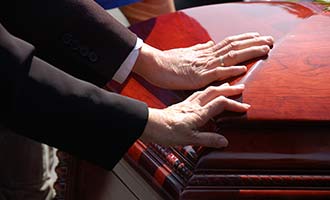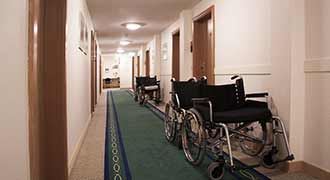
Unfortunately, nursing home abuse and neglect are common. As a result, you may be entitled to compensation for medical bills, pain, suffering, and other damages. We are working with some of the most knowledgeable lawyers specializing in nursing home abuse and neglect across the country. Unless you get an award or settlement, there will be no fee or charge. To receive a free case evaluation and no obligation, please call our toll-free number 24/7 at 1-800-992-6878 or fill out an online contact form.
If you or a loved one has sustained injury or death from nursing home abuse, you may be entitled to compensation for medical bills, pain and suffering and wrongful death (in some cases), among other losses. Our firm is working with experienced nursing home abuse lawyers in Rhode Island (RI) and there is no fee unless you win a settlement or award. Contact us for a free (no obligation) case evaluation.
Need an Experienced RI Nursing Home Abuse Lawyer?
Call d’Oliveira & Associates for a Free Case Evaluation Today!
Common RI Nursing Home Abuse Cases:

What are the different types of nursing home cases in RI
- Bed Sores and Pressure Sores
- Dehydration and Malnutrition
- Wrongful Death
- Falls
- Broken Bones
- Infections
- Medication Errors
- Mental and Emotional Abuse
Learn more about the types of abuse and neglect.
WHO ARE THE BEST RHODE ISLAND NURSING HOME ABUSE LAWYERS?
Several law firms in Rhode Island handle nursing home abuse and neglect cases. Below are several websites that contain knowledgeable attorneys. These websites include but are not limited to:
- Rhode Island Nursing Home Abuse Lawyers
- Best Law Firms In Rhode Island
What is a RI Nursing Home Abuse Case Worth?
In most cases, you or a loved one may be entitled to compensation for medical bills and pain and suffering, among other losses. Read more.
What are our Best Nursing Home Abuse Settlements?
- $450,000 – For a man who developed bedsores and pneumonia.
- $400,000 – For a woman who developed bedsores, resulting in hospitalization.
- $185,000 – For a man who sustained a broken leg in a RI nursing home.
Nursing Home Wrongful Death Cases
 Wrongful death in a nursing home occurs when the neglect of a resident results in death. The more common way this happens is when the nursing home staff fail to recognize a serious medical issue such as a heart attack or stroke before it is too late. Another, less common cause, is when staff fail to notice an infection or malnourishment of a resident that becomes so severe leading to death. We work with some of the most experienced RI nursing home abuse lawyers that can help you determine if the death of a loved one was caused by abuse or neglect.
Wrongful death in a nursing home occurs when the neglect of a resident results in death. The more common way this happens is when the nursing home staff fail to recognize a serious medical issue such as a heart attack or stroke before it is too late. Another, less common cause, is when staff fail to notice an infection or malnourishment of a resident that becomes so severe leading to death. We work with some of the most experienced RI nursing home abuse lawyers that can help you determine if the death of a loved one was caused by abuse or neglect.
Learn more about wrongful death.
What Legal Rights do Nursing Home Residents Have?
Nursing home residents have rights specially protected under both federal and state laws. For example, in 1987, Congress passed the Nursing Home Reform Act, which requires each state to develop regulations protecting the rights of nursing home residents.
Some of these rights include the right to:
- See Visitors
- Request Medical Records
- Request Information Regarding Treatment
- Refuse Medical Treatment
- Choose your own Doctor
- Freedom from Restraints or Sedation
- Privacy
- Social and physical activities
- File Grievances
- Be Free from Abuse
Nursing home facilities must provide a written statement of these rights upon request. If a facility does not adhere to or recognize these rights, it may be grounds for a nursing home abuse lawsuit.
NURSING HOME INJURY STATISTICS
There are over one million Americans who live in nursing homes today. Unfortunately, each year these numbers increase. However, one of the most common injuries in nursing homes today is falling. Below are some nursing home falling statistics.
- Around 2%-6% of these falls result in a type of fracture
- Roughly 100-200 reported falls to occur within one
- Around 10%-20%of these falls cause a severe injury
- Approximately 1,800 deaths occur from falls per year
- Around 2.6 falls per person occur per year
WARNING SIGNS OF NURSING HOME ABUSE AND EACH KIND OF ABUSE
There are a plethora of warning signs of nursing home abuse. Some signs include but are not limited to:
- Unexplained bruises
- Unexplained cuts or marks
- Sores
- Loss of finances
- Poor hygiene or malnourishment
- Be afraid
- Anxiety or depression
- Patients that express concerns regarding the staff at the nursing home
TYPES OF NURSING HOME ABUSE
There are several types of abuse.
- Physical
- Abandonment
- Financial
- Neglect
- Self-neglect
- Emotional
- Sexual
What Laws Regulate Nursing Homes in Rhode Island
Each state has state nursing home laws that outline care standards for nursing homes to follow.
FEDERAL NURSING HOME LAW
Several federal nursing home laws govern. Some of the most important laws are the nursing home reform act, the older Americans act, and the elder justice act.
RHODE ISLAND NURSING HOME LAW
In Rhode Island, elder abuse cases involving adults over 60 are looked after by the “DEA Protective Services Unit.” Rhode Island also has three statutes that govern nursing home abuse. These statutes include the Elderly Violence Prevention Act, the Citizens’ Commission for the Safety and Care of the Elderly, and the Elderly Affairs Department: Abuse of Elderly Persons. In addition, under the Rhode Island Title 23 Health and Safety laws, Chapter 17.5 deals with the Rights of Nursing Home Patients. This chapter contains 37 sections about rules and regulations for nursing homes in Rhode Island. Some of these sections include abuse, care of the patient, and rules of nursing homes.
HOW TO REPORT NURSING HOME ABUSE & NEGLECT IN RHODE ISLAND
There are several ways to report nursing home abuse and neglect in Rhode Island. People typically call the local police, contact medical experts, talk to nursing home administrators, or contact the Long-Term Care (LTC) Ombudsman program. In addition, you can contact the “State Ombudsman Program” in Rhode Island through “The National Long-Term Care Ombudsman Resource Center.” Click HERE to locate the contact information for this program.
WHICH RHODE ISLAND NURSING HOMES HAVE THE MOST VIOLATIONS?
There are 77 nursing homes located in Rhode Island. Unfortunately, many nursing homes have deficiencies and have paid thousands in fines. Out of the 77 nursing homes in Rhode Island, 17 have serious defects and have paid 1.71 million in penalties.
Below is a list of nursing homes in Rhode Island that have had the most “total deficiencies.” These nursing homes include but are not limited to:
- Bannister Ctr For Rehabilitation And Health Care
- Kingston Center For Rehabilitation And Health Care
- Elmhurst Rehabilitation & Healthcare Center
- Harris Health Center Llc
- Berkshire Place
- Oak Hill Health & Rehabilitation Center
- Hebert Nursing Home
- Trinity Health And Rehabilitation Center
- Linn Health And Rehabilitation
- St Clare Home
Below is a list of nursing homes in Rhode Island that have paid the most fines. These nursing homes include but are not limited to:
- Bannister Ctr For Rehabilitation And Health Care
- Charlesgate Nursing Center
- Mount St Rita Health Centre
- Tockwotton On The Waterfront
- St Clare Home
- Sunny View Nursing Home Inc
- Hebert Nursing Home
- Berkshire Place
- Steere House Nursing And Rehabilitation Center
- Overlook Nursing And Rehabilitation Center
Click HERE for the complete list.
On August 2, 2021, the Healthcare Quality Reporting Program of Rhode Island updated their report on the Nursing Home Summary Report. This report breaks down each nursing home, further reporting on their staffing quality, and assigning them an overall rating.
WHEN CAN YOU SUE A NURSING HOME IN RHODE ISLAND?
In Rhode Island, you can sue a nursing home anytime as long as it is within the statute of limitations. The statute of limitations in Rhode Island is three years.
IS THERE A DIFFERENCE BETWEEN NEGLECT AND MEDICAL MALPRACTICE?
Yes, there is a difference. However, it can be hard to tell the difference at times. Medical malpractice occurs when medical negligence causes the patient to suffer an injury. Medical negligence is when a medical provider fails to meet the standard of care.
WHO CAN FILE A NURSING HOME LAWSUIT?
Anyone can file a nursing home lawsuit as long as it is within the statute of limitations.
HOW DO I FILE A RHODE ISLAND NURSING HOME NEGLIGENCE CASE?
Once you have identified abuse and decide you would like to file a lawsuit, you first should report the abuse. You can report the abuse in Rhode Island through the DEA Protective Services Unit or the Rhode Island Elder Abuse Hotline. DEA Protective Services Unit phone number is 401-462-3000 and the Rhode Island Elder Abuse Hotline 800-322-2880. Once you report the abuse, you should contact an attorney to see if you have a case and, if so, to move the case forward.
WHAT TYPE OF COMPENSATION CAN YOU CLAIM?
Compensation can vary depending on several factors. These factors include but are not limited to:
- The nature of abuse
- If there is a limit on the compensation [depending on jurisdiction]
- The strength of the case
HOW LONG DOES IT TAKE TO SETTLE A CASE?
It can take as little as a few months to settle a nursing home lawsuit.
HOW LONG DO I HAVE TO FILE A RHODE ISLAND NURSING HOME ABUSE LAWSUIT?
You have three years to file a nursing home abuse lawsuit in Rhode Island.
HOW MUCH DOES IT COST TO HIRE A NURSING HOME ATTORNEY?
The cost of hiring an attorney can vary. Typically with nursing home abuse cases, lawyers work on a contingency basis. A contingency basis means that the attorney will not get paid unless you win your case.
RHODE ISLAND NURSING HOME ABUSE & NEGLECT RESOURCES
Rhode Island nursing home abuse and neglect resources include but are not limited to:
- DEA Protective Services Unit.
- Rhode Island Elder Abuse Hotline. The phone number is 800-322-2880.
- Rhode Island State Police or the Rhode Island Office of Healthy Aging
- Call 911.
HOW DO YOU PROVE A NURSING HOME LAWSUIT?
What you need to prove depends on what kind of lawsuit you file. People have filed nursing home lawsuits for a plethora of issues. These issues include but are not limited to:
- Wrongful death
- Neglect
- Sexual assault
- Emotional abuse
EXAMPLES OF NURSING HOME LAWSUITS
In a civil case against a nursing home, it is possible to recover compensation in two ways. First, you can receive compensation from a trial verdict. Second, you can settle the lawsuit through a settlement. The amount of compensation will vary depending on the situation.
How Can You Avoid Nursing Home Abuse and Neglect?
The best way to avoid abuse is to choose a nursing home that has a good reputation in your area. To ensure that you are choosing a reputable facility, be sure to ask family, friends, or physicians for recommendations. We also urge you to take a guided tour of the facility, and then return unannounced, so you can get a feel for how the residents are actually treated.
Also, most nursing homes are subject to federal inspection, so ask to review their report card to ensure compliance with regulations with no major violations on record. Finally, once your loved one has moved into the facility, contact them and visit as much as possible.
WHAT CONSTITUTES ABUSE IN A SKILLED NURSING FACILITY?
A skilled nursing facility is similar to a nursing home, except the level of care is equivalent to the care you would receive in a hospital. Abuse in a skilled nursing home comes in many forms. The most common forms include but are not limited to:
- Physical
- Neglect
- Verbal
- Emotional
WHAT IS CONSIDERED NURSING HOME NEGLECT IN RHODE ISLAND?
There are several types of nursing home neglect. These include but are not limited to:
- Neglect of Basic Needs
- Abandonment
- Self-Neglect
- Social or Emotional Neglect
- Medical Neglect
- Neglect of Personal Hygiene
Several issues can flow out of neglect in nursing homes. These include but are not limited to:
- Respiratory infections
- Amputations
- Gastroenteritis
- Choking
- Influenza
- Malnutrition
- Dehydration
- Poor hygiene
- Infections
- Medication errors
COMMON REASONS FOR NURSING HOME ABUSE & NEGLECT
There are, unfortunately, many reasons why abuse and neglect occur in nursing homes. These reasons include profit, low-quality spaces, understaffing, poor staff pay, nursing home mismanagement, and lack of staff training.
Click HERE for a video from the U.S. Department of Health and Human Services.
Red Flags to Look for in Nursing Home Abuse or Negligence:
 Once your loved one has moved into an assisted living facility, you should be sure to check in on them as much as possible. One red flag to look for is the delay or refusal of personal access to your loved one during normal visiting hours. Take note of the amount of privacy the staff allows you and your loved one during the visit.
Once your loved one has moved into an assisted living facility, you should be sure to check in on them as much as possible. One red flag to look for is the delay or refusal of personal access to your loved one during normal visiting hours. Take note of the amount of privacy the staff allows you and your loved one during the visit.
If the staff is being secretive or lingering around while you visit, it may indicate that they are trying to cover up an incident. Additionally, take note of their living environment because things like dirty bedding, dirty clothes, and poor hygiene suggest that your loved one is not receiving the attention and care they need. Finally, monitor their physical and mental health conditions, because a rapid decline in their heath may indicate neglect as well.
Rhode Island Nursing Home Abuse Lawyer Near You
Contact the Law Offices of d’Oliveira & Associates
 If you have been injured while receiving care at an assisted living, elder care, or nursing home facility, then you should consider talking to lawyer about your legal options. The experienced Rhode Island nursing home lawyers that we work with can file a lawsuit on your behalf and charge no fee unless you win an award or settlement. Contact us toll-free at 1-800-992-6878, or submit an online contact form for a free (no obligation) case evaluation.
If you have been injured while receiving care at an assisted living, elder care, or nursing home facility, then you should consider talking to lawyer about your legal options. The experienced Rhode Island nursing home lawyers that we work with can file a lawsuit on your behalf and charge no fee unless you win an award or settlement. Contact us toll-free at 1-800-992-6878, or submit an online contact form for a free (no obligation) case evaluation.
SOURCES
- https://projects.propublica.org/nursing-homes/state/RI
- https://www.nursinghomeabusecenter.com
- https://www.nursinghomeabuseguide.org/states/rhode-island/
- https://bencrump.com/chicago-personal-injury-lawyer/what-is-the-difference-between-medical-malpractice-and-negligence/
- http://webserver.rilin.state.ri.us/Statutes/TITLE23/INDEX.HTM
- https://health.ri.gov/nursinghomes/about/quality/
- https://www.aarpmedicareplans.com/medicare-articles/whats-the-difference-between-a-skilled-nursing-facility-and-a-nursing-home.html
